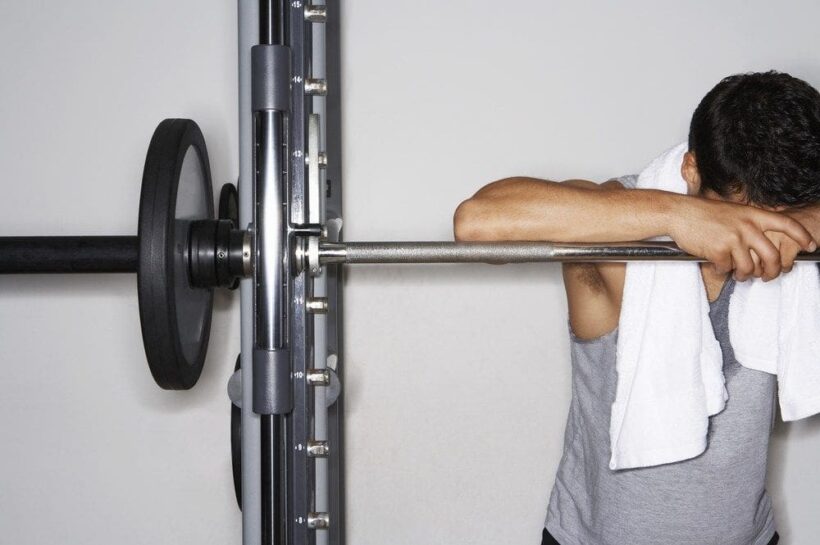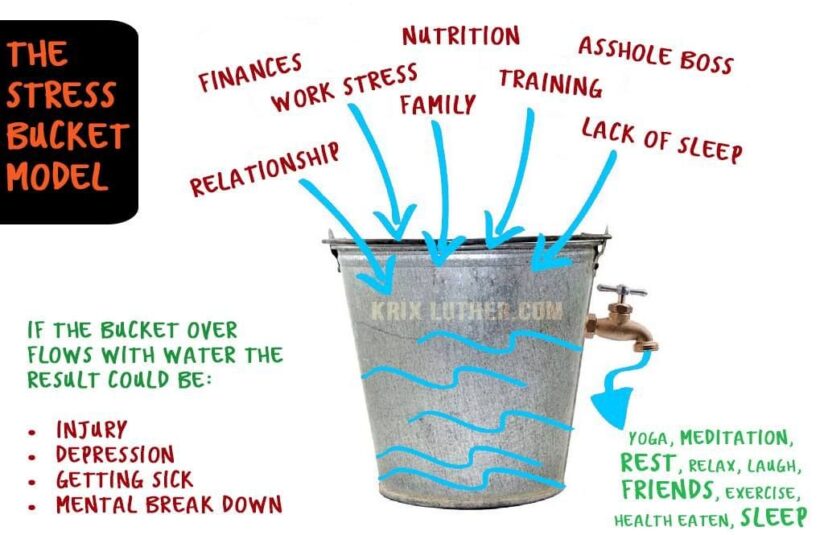Overtraining and the Stress Bucket

“If you want to train hard, you best learn to recover hard” – Krix Luther
Believe it or not, training can increase the amount of stress in your life, and stress accumulates over time.
I work closely with many Thai boxing gyms in Phuket and I get asked a lot about overtraining. These guys punish their bodies for six to eight hours day, 6 days a week. That is a ton of stress on the body. How is it that some people are able to push themselves to the breaking point, and yet never break, while others burn out after only a short time?
The best way to explain this is to use the “Stress Bucket” analogy.
All types of stress – emotional, physical, social, economical and more – build up in our stress bucket. If we cannot release the stress, it will overflow, and we will, in time, break down. This breakdown can lead to sickness, depression, decreased libido and increased susceptibility to injury.
The guys that train all day and put extreme stress on their bodies have most likely mastered strategies to keep the stress bucket levels at a minimum, despite the daily overtraining, which is why they rarely hit a breaking point.
Let me paint a picture for you of the opposite scenario, of someone who may be very close to “overflowing”.
He wakes up early in the morning after going to bed late (stress), late for work and stuck in traffic (Stress) arrives at the job that he hates (stress) where he happens to work with a a$$hole boss (stress). He hits the gym (stress on the body) after a long day at work and grabs some fast food on the way home (stress on the digestive system). Once he gets home, he encounters his nagging girlfriend (Emotional stress), so he grabs a beer from the fridge to wind down from a tough day. Finally, he gets to bed late (stress), only to wake up early the next day and repeat the same cycle yet again.
Wait, a simple work out at the gym causes stress too, even if you don’t overtrain? Isn’t working out supposed to relieve stress?
Yes, and yes again, but if your body is already overwhelmed by external stressors, training can have the opposite effect and can even add more stress to your life.
You cannot control all the outside stressors, but one way you can keep your stress bucket from overflowing is to take time every day to release stress.
The most important thing to do is to listen to your body, rest and recover. Take some time for yourself, eat healthy food, stay hydrated, rest tired muscles and try – to the best of your ability – to avoid external stressors during the day.
There are many other ways to go about relieving tension and stress in your body. I will list three that are easily accessible here in Phuket.

Stretching
You can stretch anywhere. Stretching after a workout helps relax the muscles, which increases blood flow and facilitates recovery. You can try joining a Yoga class in Phuket to help destress your day.
Myofascial Release
An easy way to achieve myofascial release – essentially, the relaxation of stiff muscles – is to get a massage. This is an extremely convenient venture for us islanders, as a good Thai massage is only 300 baht and hardly ever more than two kilometres away.
Myofascial release helps blood flow to the muscles and can lower heart rate, blood pressure and levels of cortisol – which is a stress hormone.
Being relaxed will help your body enter a parasympathetic state, the state of building up and repairing, called anabolic state. You will also find that lowering stress levels will aid in preventing burn out – also known as adrenal fatigue – which enables you to train harder for longer. If you don’t fancy a massage then grab a Foam Roller and do it yourself, there are many benefits to using a Foam Roller and can be a cheaper option.
Ice Bath
One of my favourite methods of recovery, and accessible in Phuket, is a good ice bath. A few local establishments that have saunas also have ice baths, and I highly recommend you start taking advantage of them.
Ice cold water will force your blood vessels to constrict. Conversely, heat makes your blood vessels dilate. One theory is that the alternation between constriction and dilation in blood vessels helps eliminate waste and toxins, such as lactic acid, which builds up during a hard workout.
If you can keep your stress bucket levels under control, you will be able to push your body to the limit – in a good way – and avoid sickness and injury as well. You will also generate greater and faster results when it comes to sculpting your body.
Conclusion:
Keep your stress levels under control if you want to train harder for longer and get maximum results from your workouts. If you are feeling a quite stressed then maybe swap your workout for Yin Yoga Session, morning walks along the beach or try Meditating, there are a lot of Physical Benefits of Meditation. The stress bucket analogy is not an excuse to skip training and go home and eat ice cream. Do something each day that benefits your health and wellbeing but just be smart and more balanced about it.
Author

Krix Luther has been Personal Trainer in Phuket for more than 10 years, specializing in strength and conditioning, fat loss and TRX Training. For more information about Krix and his services, visit KrixLuther.com
Latest Thailand News
Follow The Thaiger on Google News:


























